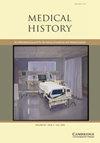谈判促进心理健康的南南合作:世界卫生组织和非洲心理健康行动小组,1970 - 90年代
IF 0.9
2区 哲学
Q4 HEALTH CARE SCIENCES & SERVICES
引用次数: 0
摘要
本文探讨了非洲精神卫生行动小组(AMHAG),这是世界卫生组织(WHO)试图通过《发展中国家技术合作》设想的南南合作促进“所有权”而不是发展的最早例子之一。心理健康咨询小组成立于1978年,目的是指导国家和区域的心理健康政策,同时促进国家和集体的自力更生。在20世纪70年代末至90年代初的一个短暂时期内,它是世卫组织在非洲初级卫生保健中促进精神卫生政策的战略的核心。这在很大程度上是一种无效的工具,各国政府对精神卫生的价值有不同的看法,AMHAG国家之间的协调也很差。然而,本文将AMHAG视为一个区域项目和跨国网络,探讨了区域和区域主义在国际卫生合作中的重要性,以及参与卫生发展的不公平现象。根据世卫组织跨越20多个国家和两次民族解放运动的档案材料,报告认为,参与国的定位不同,不仅要处理国家之间的关系,而且要应对不断变化的国际援助形势,以及(对某些国家来说)战争、暴力和政治及经济不稳定的背景。这篇文章不仅作为一个失败的发展计划中权力不平衡的案例研究,而且还揭示了世界卫生组织在非洲精神病学历史学家往往忽视的一段时期内与精神卫生的接触。本文章由计算机程序翻译,如有差异,请以英文原文为准。
Negotiating South–South cooperation for mental health: the World Health Organization and the African Mental Health Action Group, 1970s–90s
Abstract This article explores the African Mental Health Action Group (AMHAG), one of the earliest examples of the World Health Organization’s (WHO) attempts to promote ‘ownership’ over development through the South–South cooperation envisaged in Technical Cooperation in Developing Countries. Formed in 1978, the AMHAG was intended to guide national and regional policy on mental health, while also fostering national and collective self-reliance. For a short period, between the late 1970s and the early 1990s, it was central to the WHO’s strategy for promoting policies of mental health in primary healthcare in Africa. It was a largely ineffective tool, with national governments having different opinions on the value of mental health, and poor coordination between AMHAG countries. Approaching the AMHAG as a regional project and transnational network, however, the article provides explores the importance of regions and regionalism in international health cooperation, as well as the inequities of participation in health development. Drawing on WHO archival material spanning over twenty countries and two national liberation movements, it argues that participating countries were differently positioned not only to navigate relationships between countries, but also to contend with the shifting landscape of international assistance, as well as – for some – contexts of war, violence and political and economic instability. The article not only serves as a case study of power imbalances in a failed development initiative, but also sheds light on the WHO’s engagement with mental health during a period that historians of psychiatry in Africa have tended to overlook.
求助全文
通过发布文献求助,成功后即可免费获取论文全文。
去求助
来源期刊

Medical History
医学-科学史与科学哲学
CiteScore
1.60
自引率
0.00%
发文量
25
审稿时长
>12 weeks
期刊介绍:
Medical History is a refereed journal devoted to all aspects of the history of medicine and health, with the goal of broadening and deepening the understanding of the field, in the widest sense, by historical studies of the highest quality. It is also the journal of the European Association for the History of Medicine and Health. The membership of the Editorial Board, which includes senior members of the EAHMH, reflects the commitment to the finest international standards in refereeing of submitted papers and the reviewing of books. The journal publishes in English, but welcomes submissions from scholars for whom English is not a first language; language and copy-editing assistance will be provided wherever possible.
 求助内容:
求助内容: 应助结果提醒方式:
应助结果提醒方式:


